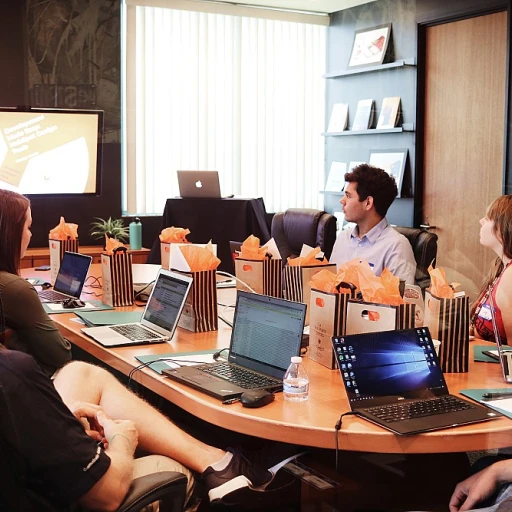
Understanding the Need for Reskilling
The rapidly evolving job market underscores an urgent need for reskilling. In this context, it's vital to assess the gap between current skills and the competencies required by today's fast-paced industries. With advancements in technology and the continuous improvement of digital tools, individuals must adapt to remain competitive. This shift is driven by globalization, the growth of specific training methods, and an increased emphasis on tailored assessment techniques.
Adapting to a Changing Workforce
The age of traditional methods has seen its decline with the advent of cutting edge approaches to learning. Employees now face different challenges and opportunities, requiring a multi-faceted set of skills that can only be gained through targeted reskilling efforts. This need becomes more apparent as we view global trends, particularly in regions like Saudi Arabia, which are experiencing rapid economic transformation.
Addressing Learner Anxiety and Stress
The pressure to keep up with these changes can lead to increased levels of anxiety, stress, and, in some cases, effects on mental health such as obsessive-compulsive disorders or anxiety disorders. As such, reskilling initiatives must consider not only the assessments of skills but also the well-being of participants to render them effective. The performance level of workers can only be sustained through balanced methods that help identify and manage these challenges, contributing to continuous improvement.
Realizing the Vision and Mission of Reskilling
For reskilling to be effective, the assessment methods used must be robust, accurate, and adaptive to the learners' needs. Incorporating innovative assessment strategies that include real-time feedback mechanisms is crucial. These strategies can range from the use of virtual reality in training environments to digital assessments that provide immediate results. Through a blend of new techniques and feedback systems, organizations can better align their vision and mission with the goals of both the individual and the company.
The Role of Assessment in Reskilling
The Importance of Assessments in the Reskilling Journey
In the ever-evolving landscape of professional development, the role of assessment in reskilling cannot be overstated. As industries undergo rapid transformations, the need to continuously evaluate and adapt skills becomes paramount. Assessments serve as a critical tool in this process, helping to identify specific areas where individuals may need further development or support.
Traditional methods of assessment, while still valuable, often fall short in addressing the dynamic needs of today's workforce. They can sometimes induce anxiety, especially for those with anxiety disorders or stress disorders, by focusing too heavily on rote memorization or standardized testing. This is where innovative assessment techniques come into play, offering a more nuanced view of an individual's capabilities.
Enhancing Learning Through Feedback
One of the key benefits of modern assessment methods is the ability to provide real-time feedback. This continuous improvement loop allows learners to adjust their approach and focus on areas that require more attention. Feedback is not just about pointing out weaknesses; it's about recognizing strengths and encouraging growth. This approach can significantly reduce performance anxiety and help individuals with obsessive-compulsive tendencies to channel their focus constructively.
Cutting-Edge Techniques for a New Age
Incorporating cutting-edge assessment techniques, such as digital tools and virtual reality, can offer a more immersive and engaging learning experience. These methods are particularly beneficial in assessing practical skills and competencies that traditional assessments might overlook. For instance, virtual reality can simulate real-world scenarios, providing a safe environment for learners to practice and refine their skills without the fear of real-world consequences.
As we explore these innovative methods, it's crucial to consider the specific needs of different learners. Tailoring assessments to accommodate various learning disorders, such as PTSD or other anxiety disorders, ensures that everyone has an equal opportunity to succeed. This approach aligns with the vision and mission of creating an inclusive and supportive learning environment.
For a deeper understanding of how these assessment methods are transforming the reskilling landscape, you can explore more about understanding training abbreviations in reskilling.
Innovative Assessment Techniques
Exploring Fresh Approaches to Evaluating Skills
In our ever-evolving world, innovative assessment techniques are essential in the reskilling arena. These methods go beyond traditional approaches, addressing a range of learning needs and health challenges.- Adaptive Assessments: These cutting-edge assessments adapt to learners' skill levels in real time. They help identify specific areas needing improvement, fostering continuous improvement and enhancing learning outcomes. Emphasizing edge assessment techniques, they reduce test anxiety by tailoring questions to learners’ abilities.
- Virtual Reality (VR): Using VR in assessments provides a dynamic and immersive experience. It offers a stress-free environment, particularly beneficial for individuals with anxiety disorders or stress-related concerns. VR allows a more thorough assessment of skills in simulated real-world scenarios, offering feedback that can be directly applied to professional situations.
- Peer and Self-Assessments: Incorporating peer feedback and self-assessment into learning techniques can provide a unique view of one's performance. These methods encourage accountability and self-reflection, crucial for professional growth and continuous improvement.
- Digital and Online Tools: With the integration of advanced technology, digital tools facilitate innovative techniques for assessing skills. These tools provide immediate, personalized feedback, supporting an age of digital transformation while offering flexible access to assessments.
Understanding these approaches requires a view that considers both digital transformation in the workforce and learning disorders such as obsessive-compulsive disorder or anxiety disorders. These innovative techniques are pivotal in creating an inclusive reskilling environment that values diverse abilities.
For a comprehensive look into enhancing workforce skills, including cutting-edge strategies and assessment methods used in Saudi Arabia and beyond, visit enhancing workforce skills.
Technology's Impact on Assessment
Embracing Technology in Modern Assessments
The growing need for reskilling has placed technology at the forefront of assessment methods, reshaping the way we evaluate learning and performance. Modern approaches are leveraging cutting-edge technology to ensure that individuals are not only equipped with necessary skills but also ready to tackle the challenges of today's dynamic job market. One key advantage of technology-driven assessments is their ability to provide real-time feedback. This immediate insight helps learners identify areas for improvement and fosters a culture of continuous improvement. By adopting digital tools, such as virtual reality, assessments can simulate real-world scenarios, allowing individuals to practice and refine their skills in a controlled environment. Moreover, technology facilitates a more personalized approach to learning. Traditional methods often fail to address individual learning disorders or stress-related issues like anxiety disorders or obsessive-compulsive disorder. Innovative assessment techniques can be tailored to accommodate specific needs, ultimately reducing anxiety and boosting performance. This personalization is crucial in an age where mental health plays a significant role in learning and development. Additionally, the integration of technology in assessments allows organizations to gather and analyze vast amounts of data. Such data-driven insights can help identify trends and areas for improvement, contributing to strategic decision-making and policy formulation. With an evidence-based view, businesses and educational institutions can better align their reskilling efforts with industry demands. While these advancements offer numerous benefits, they also present challenges, which need to be carefully navigate. As we continue to explore innovative assessment techniques, it is essential to strike a balance between technology and human-centric approaches, ensuring that assessments are both effective and inclusive.Challenges in Implementing New Techniques
Overcoming Obstacles in Adopting New Assessment Approaches
When it comes to implementing innovative assessment techniques for reskilling, various challenges can arise. These hurdles can range from the technological aspects to the psychological and logistical factors affecting both learners and institutions. One significant barrier is the anxiety disorders that learners often face when exposed to unfamiliar evaluation methods. The shift from traditional methods to cutting-edge assessment techniques can induce stress disorders such as obsessive-compulsive behaviors or even performance anxiety. Providing continuous feedback and creating an environment of continuous improvement can help mitigate these issues. Moreover, the assessment methods themselves can present difficulties. The incorporation of digital tools and virtual reality may offer revolutionary benefits but can also prove challenging to integrate effectively. Institutions must consider the learning curve associated with these technologies. Ensuring that assessors are proficient in using these tools is paramount to accurate performance assessments. From an operational standpoint, the search for and application of specific learning techniques that suit the age level and health conditions of learners is essential but often hampered by limited resources or expertise. Cultural differences, such as those found in regions like Saudi Arabia, may also play a role, creating a need for tailored assessment methods that respect local customs and educational standards. Additionally, the views of key stakeholders, including educators and learners, need to be considered for a smooth transition. This involves the willingness of assessors to move away from traditional evaluation paradigms and adapt to innovative methods, fostering real-time feedback mechanisms that are more indicative of a learner's progress. In summary, while the adoption of new assessment techniques offers a pathway to enhanced learning and development, there are notable challenges that need to be addressed. Bridging the gap between technology and human factors through strategic planning and continuous dialogue can help in achieving a balanced assessment landscape. By understanding these obstacles, institutions can better prepare to implement cutting-edge solutions that not only assess but also inspire.Future Trends in Reskilling Assessments
Anticipating Changes in Reskilling Approaches
In the realm of reskilling, the ever-evolving landscape of assessment techniques continues to adapt, especially as technology plays an increasingly significant role. This ongoing transformation is not merely about employing cutting-edge digital tools but aligning these methods with specific learning outcomes and individual needs. As we move forward, several key trends are emerging:- Real-Time Feedback: Continuous improvement in assessment methods allows immediate insights into a person's performance. This real-time feedback helps identify areas of strength and areas requiring further attention, making the learning process more dynamic.
- Adaptive Learning Technologies: These tools assess the learner's level and adjust the content accordingly. They cater to individuals with different learning disorders or anxiety disorders by providing a tailored learning experience.
- Virtual Reality and Simulation-Based Techniques: These innovative techniques offer immersive environments that enhance experiential learning. Such methods are promising, especially in fields where traditional methods struggle to deliver the same level of engagement and practical application.
- Focus on Wellness and Mental Health: As awareness of issues like obsessive compulsive disorder and post-traumatic stress disorder (PTSD) grows, assessment methods are increasingly considering the mental health impacts of learning and performance pressures.













